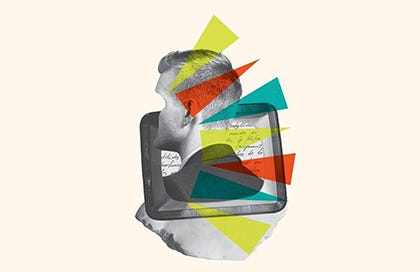How We Lost the Meaning of Self: Trueman’s Prophetic Analysis of Modern Identity
The Rise and Triumph of the Modern Self
In HBO’s critically acclaimed series The Last of Us, a scene unfolds when Ellie, a lesbian character, responds to her bisexual partner’s pregnancy announcement by declaring she’ll be “a dad” to the child conceived with their male friend. This reminded me of the excellent book by Carl Trueman: The Rise and Triumph of the Modern Self: Cultural Amnesia, Expressive Individualism, and The Road to Sexual Revolution.
“I’m a woman trapped in a man’s body” is the springboard of the book. Like Ellie’s statement that she would be “a dad,” not long ago that statement would have been considered nonsense, and anyone saying it would be morally suspect. Today, if you even question the validity of that statement, you are considered a bigot and deemed unworthy of any social standing. How did we get from point A to point B?
A Scholarly Roadmap
The Rise and Triumph of the Modern Self offers a remarkably even-handed historical analysis that traces how Western culture arrived at our current understanding of identity. Unlike many contemporary works addressing cultural shifts, Trueman avoids both lamentation and apologetics, instead providing readers with a carefully researched intellectual history. His scholarship illuminates the philosophical, social, and cultural developments that have shaped modern conceptions of selfhood—from Rousseau and the Romantics through Freud and the sexual revolution, to today’s identity politics. Trueman refrains from political partisanship or offering comprehensive solutions, with only brief reflections for Christian readers in the conclusion.
Trueman writes:
At the heart of this book lies a basic conviction: the so-called sexual revolution of the last sixty years, culminating in its latest triumph—the normalization of transgenderism—cannot be properly understood until it is set within the context of a much broader transformation in how society understands the nature of human selfhood. The sexual revolution is as much a symptom as it is a cause of the culture that now surrounds us everywhere we look, from sitcoms to Congress.
Intellectual Foundations: Reimagining the Self
Trueman structures his historical analysis across four parts, each building upon the previous to trace the evolving concepts of selfhood through time. In part one, he establishes the essential intellectual framework that undergirds the entire narrative, acknowledging from the outset that he’s embarking on what he terms a “long and complicated story.” He draws deeply from Philip Rieff, Charles Taylor, and Alasdair MacIntyre. Pay special attention to this section, noting especially Rieff’s distinction between “mimesis” (living in accordance with external meaning) and “poiesis” (creating one’s own meaning), Taylor’s notion of the “social imaginary” (the pre-theoretical ways societies understand themselves), and MacIntyre’s analysis of “expressive individualism” (the modern prioritization of self-discovery and self-expression). These concepts don’t merely appear as academic jargon but function as essential interpretive keys that Trueman consistently employs to unlock each subsequent historical development.
Philosophical Architects of Modern Identity
Part Two begins the historical narrative and focuses on concepts introduced by Rousseau, the Romantics, Nietzche, Marx, and Darwin. I found this part of the book fascinating, because we don’t typically think about or mention these historical figures very much outside of academia, but they had a profound influence on how we think culturally. The most surprising to me is Nietzche, who I imagine most people today don’t really know much about at all. These thinkers psychologized identity and the idea of selfhood. Human identity became plastic and completely pliable.
Trueman writes of Nietzsche, Marx, and Darwin:
These three effectively strip away the metaphysical foundations for both human identity and for morality, leaving the latter, as Nietzsche is happy to point out, a matter of mere taste and manipulative power games.
The Sexualization of Psychology
Part Three focuses on psychology, and specifically Freud and others who advanced Freudian concepts. Trueman explains how these concepts sexualized psychology. Building on the concepts of those who came before, identity became sexualized. Then with Marx, identity became politicized, which means sexuality also became politicized.
Part four brings us to our current day and culture. Trueman explains how the concepts previously mentioned have worked together to currently shape our society and culture. He highlights how the concepts of the therapeutic self have played out in higher education and the Supreme Court. Finally, Trueman examines the rise and acceptance of transgenderism. All of these concepts demand that traditional frameworks of identity be labelled and destroyed.
The Dangerous Landscape of Self-Worship
Our modern obsession with identity—psychologically, sexually, racially, therapeutically—has created a culture that worships “self” like no other. In fact, we worship our ability to self-identify and self-create to the point that identity is completely pliable. It means nothing. A lesbian can proclaim herself a father. Anything goes, unless it threatens my autonomous concept of selfhood. Our culture is now anticulture. “Everyone did what was right in his own eyes.” (Judges 17:6) It’s a dangerous place to be.
The Rise and Triumph of the Self stands as an intellectual tour de force that has fundamentally altered how I understand our cultural moment. I’ve returned to this book repeatedly over the past few years. It’s easily one of my favorite books of the last 10 years. For anyone seeking to understand the massive shifts in how we conceptualize selfhood, identity, and fulfillment, this is essential reading.







